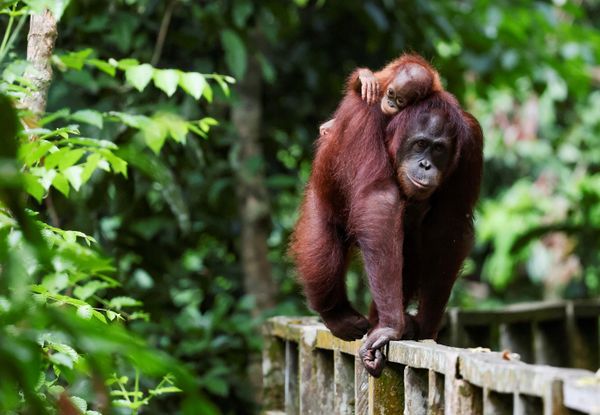By Yasmin Ramlan
SHAH ALAM, Feb 7 — The federal government is strengthening laws, conservation, and partnerships with domestic and international groups, including indigenous and local communities, to protect endangered primates.
Natural Resources and Environmental Sustainability Minister Nik Nazmi Nik Ahmad said one of the initiatives is intensifying conservation efforts, with Malaysia implementing the Global Wildlife Programme, which began in 2023 and will run until 2028.
The project, funded with US$7.1 million (RM31.5 million) from the Global Environment Facility, aims to build institutional capacity to combat wildlife crime and reduce poaching nationwide.
“One of its components is focusing on the conservation of the Bornean orangutan and its habitats in target protected areas in Sarawak.
“The government has worked to protect other primates in Peninsular Malaysia, such as the silvered langur and long-tailed macaque, through habitat protection and species monitoring.
“The Wildlife and National Parks Department of Peninsular Malaysia is finalising the human-primate conflict management plan in Peninsular Malaysia to address problems caused by primate species,” he told Selangor Journal when contacted.
[caption id="attachment_387292" align="aligncenter" width="1200"] Image for illustration purposes only. — Picture via UNSPLASH/JAMES LO[/caption]
Image for illustration purposes only. — Picture via UNSPLASH/JAMES LO[/caption]
To boost existing laws and measures to enhance wildlife protection, Nik Nazmi said Malaysia will sign a Memorandum of Understanding (MOU) on the Cooperation to Combat Illegal Animal Trade with Thailand this year.
“The MOU, among other things, is intended to strengthen cooperation between the law enforcement of both countries, in particular at the border areas, to discover and counter illegal wild animal trade and trafficking both within the territory and across borders,” he said.
During the tabling of Budget 2025 last year, Prime Minister Datuk Seri Anwar Ibrahim announced an increase in the Ecological Fiscal Transfer for Biodiversity Conservation funding from RM200 million to RM250 million to support forest and wildlife protection efforts.
The number of Orang Asli community rangers will also be increased to 2,500 from the previous 2,000, with an allocation of RM80 million.
According to the International Union for Conservation of Nature, of the 26 primate species that call Malaysia home, 15 are endangered or critically endangered, while eight others are vulnerable and three are categorised as near threatened.
In a recent special report from Selangor Journal regarding human-wildlife conflict involving primates, Nadine Ruppert, associate professor of Universiti Sains Malaysia’s School of Biological Sciences, said deforestation for agriculture, logging, and urban development have reduced available habitats for these species.
She said habitat fragmentation has isolated primate populations, making it difficult for them to find food, mates, and shelter. This leads to inbreeding and reduced genetic diversity, which further threatens their survival, especially in their vulnerable state.
Nik Nazmi, in his response to the report, said the government has taken several measures to protect endangered primates, including the establishment of national parks and wildlife reserves dedicated to habitat restoration and reforestation.
[caption id="attachment_387293" align="aligncenter" width="1200"] Image for illustration purposes only. — Picture via UNSPLASH/ETIENNE GIRARDET[/caption]
Image for illustration purposes only. — Picture via UNSPLASH/ETIENNE GIRARDET[/caption]
He said these efforts are vital for preserving the natural habitats of endangered primates, such as Taman Negara.
“Malaysia has taken steps to restore and protect critical habitats for endangered primates. Restoration projects and land use planning are focused on maintaining key rainforest habitats for species like primates.
“These projects help mitigate the effects of logging, palm oil plantations, and other human activities that threaten wildlife,” he said.
He explained that the Forestry Department of Peninsular Malaysia is continuing efforts to expand permanent forest reserves to increase available wildlife habitats.
Among other initiatives are intensifying joint strategic enforcement, including regular patrolling of national parks, training enforcement officers, and increasing penalties for wildlife crimes. The Wildlife Crime Unit collaborates with local authorities to ensure better enforcement of wildlife protection laws.
Nik Nazmi said more endeavours are in the form of conducting research, raising awareness, and implementing conservation projects with non-governmental organisations (NGOs) and international agencies like WWF-Malaysia.
He said the government is supporting research on the status of endangered primates, often in partnership with universities and NGOs. These researchers help to track populations, understand behaviours, and identify threats to survival.
He added that in some areas, the government has funded the development of wildlife corridors, which connect fragmented habitats and allow for safer movement between protected areas for primates.
“Despite these efforts, the challenges facing primates in Malaysia remain significant due to habitat loss, the illegal wildlife trade, and climate change.
“However, the government’s ongoing commitment to both national and international conservation efforts, as well as its collaboration with NGOs, provide hope for the future of these endangered species,” he said.




